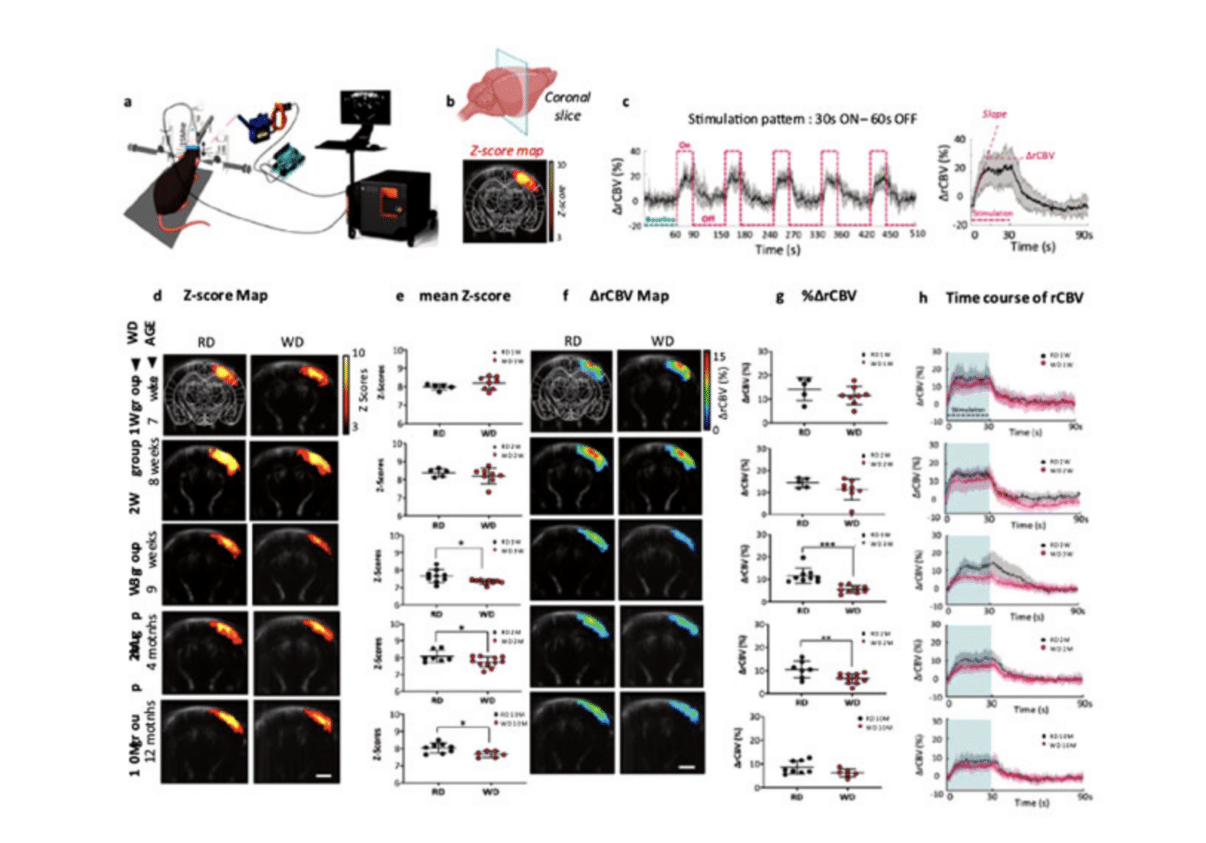A study published in the International Journal of Obesity uses fUS imaging to show directly that poor diet in the mouse has a negative effect on the ability of the brain to regulate blood flow – but one that can be reversed by changing the diet. This has implications for human health, because it suggests that the impact of age-related neurodegenerative disorders could be lessened by simple interventions such as dietary improvements or nutraceutical supplements.
When neurons fire in the brain, the oxygen needed is supplied by a temporary increase in blood flow to the active region – a phenomenon known as functional hyperemia. Poor regulation of functional hyperemia has been linked to neurodegenerative disorders such as Alzheimer’s Disease, for which poor diet and obesity are known risk factors. There is therefore a desire to understand the link between diet and functional hyperemia in more detail.
To fill this knowledge gap, French researchers – jointly led by Iconeus co-founder Mickael Tanter at ESPCI Paris, and Hirac Gurden at Université Paris Cité – have investigated the consequences of poor diet upon brain function in mice, usingfunctional ultrasound (fUS) to image the whole brain non-invasively.
Imaging the mouse brain with fUS
In the study, adolescent mice were fed a high-fat, high-sugar diet mimicking poor-quality ‘Western-style’ diets, with a surfeit of inflammation-promoting ω–6 fatty acids relative to ω–3 fatty acids. This meant that these mice rapidly gained weight and developed characteristics of a prediabetic state, including insulin resistance and impaired glucose metabolism.
The researchers then monitored the effect on functional hyperemia in these mice by stimulating their whiskers and mapping the blood flow response in the brain using fUS. This was done by placing the anesthetized animal on a stereotaxic frame to stabilize its head, and using a 15 MHz ultrasound probe in conjunction with the Iconeus One fUS system to acquire and process the data.
The result was images of the whole mouse brain, which as expected showed activation in a region called the contralateral barrel cortex, part of the somatosensory cortex where signals from the body are processed. It was clear that functional hyperemia was significantly weakened in adolescent mice fed the Western-style diet compared to controls, and this impairment was amplified as they continued through to middle age.
Interestingly, mice fed a healthy diet, with a more even balance of ω–6 and ω–3 fatty acids, also showed two periods of lower functional hyperemia, which correlates to a similar effect observed in humans.
Restoring functional hyperemia ability
Having determined that the effect of diet on functional hyperemia can be studied in this way, the researchers then turned to the question of whether the loss of functional hyperemia that occurs with an imbalance of ω–3 and ω–6 fatty acids could be restored by switching to a better diet. To do this, they supplemented the Western-style diet in adolescent mice with an ω–3 fatty acid called docosahexaenoic acid, and repeated the long-term brain imaging study. Encouragingly, they found that this balancing of the ω–3:ω–6 fatty acid ratio prevents the negative effects on functional hyperemia in obese mice, even into adulthood.
This finding is of considerable relevance to human health, say the researchers, because it suggests that supplementing unhealthy diets with nutraceuticals such as docosahexaenoic acid could help to restore functional hyperemia. This would therefore be a possible way to reduce the harm caused by poor diet, and particularly the potential for damaging effects on brain health.
Bruno Osmanski, co-founder and Chief Scientific Officer at Iconeus, said “As demonstrated in this study, the high spatiotemporal resolution of fUS makes it a valuable tool for non-invasively detecting functional hyperemia in mice, and so for investigating the role of poor diet upon brain function. Although this work is at an early stage, it represents a very promising line of inquiry, and one which could lead to simple, affordable ways of improving diet, and potentially minimizing the incidence and severity of brain diseases in later life”.

Reference:
H. Soleimanzad, C. Morisset, M. Montaner, F. Pain, C. Magnan, M. Tanter and H. Gurden, Western diet since adolescence impairs brain functional hyperemia at adulthood in mice: Rescue by a balanced ω-3:ω-6 polyunsaturated fatty acids ratio, International Journal of Obesity, 2025 (published online), DOI: 10.1038/s41366-025-01711-x.
